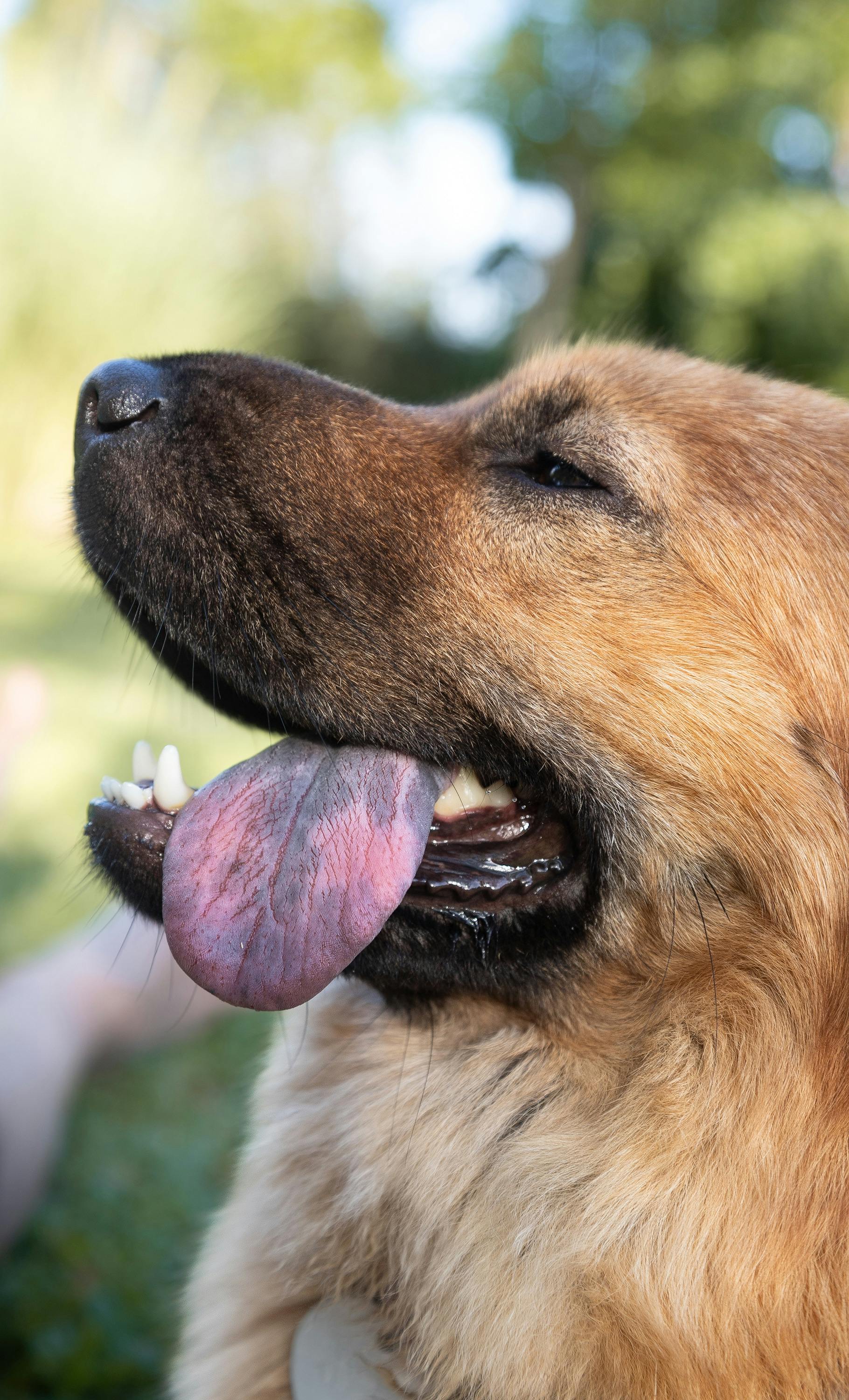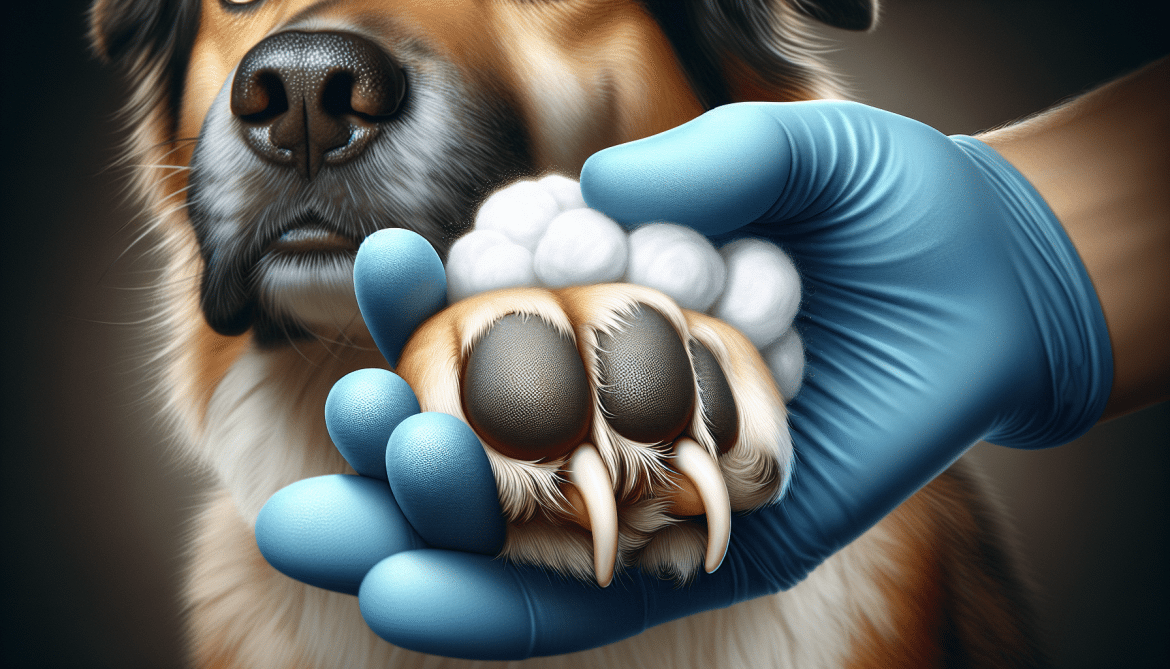If you're a dog owner, you know that those adorable furry creatures can sometimes find themselves in less-than-adorable situations, like common infections or abscesses. But fret not! In this article, we'll walk you through some simple steps to provide DIY healthcare for your beloved canine companion. From identifying the symptoms to administering proper treatments, we've got you covered. So grab your furry friend and let's get started on keeping them happy and healthy!
I. Introduction to DIY Healthcare for Dogs
Understanding the importance of at-home care for dogs
When it comes to the health and well-being of our beloved dogs, we all want the best for them. While professional veterinary care is essential, there are times when we can take matters into our own hands by providing DIY healthcare. DIY healthcare for dogs involves treating common infections and abscesses at home, under careful guidance and monitoring. This can be a great way to ensure that our furry friends receive prompt care and support, especially for minor ailments that can be managed effectively without a trip to the vet.
Benefits and limitations of DIY healthcare
Opting for DIY healthcare for dogs comes with several benefits. Firstly, it allows you to provide immediate care to your dog, as you can start treating them as soon as you notice the symptoms. DIY healthcare also offers the convenience of home-based treatment, eliminating the stress that dogs may experience during vet visits. Additionally, treating minor infections and abscesses at home can save you money on veterinary bills.
However, it is crucial to understand the limitations of DIY healthcare. Not all ailments can or should be treated at home. Some conditions may require a professional assessment and treatment. It is important to recognize the severity of the infection or abscess and seek veterinary assistance when necessary. Remember, the health and well-being of your dog should always be the top priority.
Ensuring safety and seeking professional advice
Before embarking on any DIY healthcare treatments for your dog, it is essential to prioritize their safety. Always consult with a veterinarian before starting any home treatment. They can provide guidance on the appropriate remedies and methods to ensure the best outcome for your dog's health. Consulting with a professional will also help you determine whether the condition can be managed at home or requires immediate veterinary attention.
Remember, DIY healthcare should only be pursued for minor infections or abscesses that are not severe or life-threatening. If your dog's condition worsens or persists, it is crucial to seek veterinary assistance immediately. Trusting the expertise of a veterinarian is essential to keep your furry friend healthy and happy.
II. Common Infections in Dogs
Identifying symptoms and causes
Dogs, just like humans, are susceptible to various infections. By being aware of the common symptoms, you can promptly identify and address them. Symptoms of infections in dogs can include redness, swelling, discharge, itching, discomfort, and changes in behavior or appetite.
The causes of dog infections can vary, and it is essential to address the underlying cause to effectively treat the infection. Common causes of infections include bacteria, viruses, fungi, parasites, allergies, poor hygiene, and environmental factors.
Preventing infections through regular hygiene practices
Prevention is always better than cure, and practicing good hygiene can go a long way in keeping infections at bay. Regularly bathing your dog with a mild, dog-friendly shampoo can help remove dirt, bacteria, and potential irritants from their fur and skin. Pay close attention to their ears, paws, and any other areas that are prone to infections.
Additionally, keeping your dog's living environment clean is crucial in preventing the spread of infections. Regularly clean and sanitize their bedding, toys, and food and water bowls. Avoid exposing your dog to environments where they may come into contact with infected animals or contaminated surfaces.
Home remedies for minor infections
For minor infections, there are several safe and effective home remedies that you can try. Natural remedies like diluted apple cider vinegar can be used as a gentle antiseptic for cleaning and disinfecting impacted areas. Applying coconut oil or aloe vera can help soothe irritated skin and promote healing. Keep in mind that these remedies should always be used under veterinary guidance and monitoring.
It is important to note that home remedies are not a substitute for veterinary care. While they can provide temporary relief and support, professional attention may still be necessary for more severe or persistent infections. Regularly monitoring your dog's condition and seeking veterinary advice when needed is crucial for their overall well-being.

This image is property of images.pexels.com.
III. DIY Treatment for Skin Infections
Cleaning and disinfecting the affected area
When it comes to treating skin infections, proper cleaning and disinfection of the affected area are essential. Start by gently washing the area with a dog-friendly, mild antiseptic solution or clean water. Use a soft cloth or cotton pad to avoid further irritation. Pat the area dry with a clean towel, making sure to be gentle and avoid rubbing.
Applying natural remedies like coconut oil or aloe vera
After cleaning the affected area, you can apply natural remedies like coconut oil or aloe vera. These natural substances have soothing properties and can aid in the healing process. Apply a thin layer of coconut oil or aloe vera gel to the affected area and gently massage it in. This can help alleviate any itching or discomfort your dog may be experiencing.
Using over-the-counter antiseptic ointments
Over-the-counter antiseptic ointments can also be used to treat minor skin infections in dogs. These ointments are readily available at pet supply stores or pharmacies. Make sure to choose a product specifically formulated for dogs and follow the instructions for application. Apply a thin layer of the ointment to the affected area, gently massaging it in. Be cautious not to apply too much, as it may cause further irritation.
Monitoring the progress and seeking veterinary help if necessary
Throughout the treatment process, it is important to closely monitor the progress of the skin infection. Keep an eye on the redness, swelling, discharge, and any changes in your dog's behavior or appetite. If there is no improvement within a few days or if the symptoms worsen, it is crucial to seek veterinary assistance. A professional assessment will help determine if the infection requires further treatment or additional measures.
IV. Managing Ear Infections at Home
Recognizing the signs of ear infections
Ear infections are common in dogs, especially those with floppy ears or hairy ear canals. It is essential to recognize the signs of ear infections to address them promptly. Symptoms of ear infections can include shaking of the head, scratching or rubbing of the ears, odor from the ears, redness or swelling, discharge, and changes in behavior or balance.
Cleaning the ears gently using vet-approved solutions
To manage ear infections at home, it is crucial to clean your dog's ears regularly using vet-approved solutions. These solutions are specifically formulated to maintain ear health and prevent infections. Follow the instructions provided with the solution and apply it to a clean cotton pad or gauze. Gently wipe the visible parts of the ear, being careful not to insert anything into the ear canal.
Applying natural ear remedies like diluted apple cider vinegar
In addition to regular cleaning, natural ear remedies can help manage ear infections. Diluted apple cider vinegar can act as a natural antiseptic and help maintain the ear's pH balance. Mix equal parts of apple cider vinegar and water, and apply a few drops into your dog's ear. Gently massage the base of the ear to distribute the solution. Allow your dog to shake their head, and then use a clean cloth to gently remove any excess liquid.
Using prescribed ear drops or antibiotics when needed
For more severe ear infections, your veterinarian may prescribe ear drops or antibiotics. It is important to follow their instructions carefully and administer the medication as directed. Applying the prescribed ear drops or giving oral antibiotics can help eliminate the infection and prevent further complications. Keep in mind that proper diagnosis and treatment guidance from a veterinarian are essential for managing ear infections effectively.

This image is property of images.pexels.com.
V. Home Treatment for Urinary Tract Infections
Identifying UTI symptoms in dogs
Urinary tract infections (UTIs) can cause discomfort and pain for dogs. Identifying the symptoms of UTIs can help you provide appropriate home treatment. Common symptoms of UTIs in dogs include frequent urination, difficulty or pain while urinating, blood in urine, foul-smelling urine, increased thirst, lethargy, and changes in appetite.
Encouraging increased water intake
One of the most beneficial ways to manage a UTI at home is by encouraging increased water intake. Water helps flush out bacteria and promotes urinary tract health. Ensure that your dog has access to fresh, clean water at all times. You can also consider adding additional water sources throughout the house, such as multiple water bowls or a pet water fountain, to encourage regular hydration.
Adding cranberry supplements or juice to the diet
Cranberry supplements or juice can also aid in managing UTIs in dogs. Cranberries contain properties that can help prevent bacteria from sticking to the urinary tract walls. Consult with your veterinarian before incorporating cranberry supplements or juice into your dog's diet. They can provide guidance on the appropriate dosage and recommend specific products suitable for your dog.
Using probiotics to maintain urinary tract health
Probiotics are beneficial bacteria that can help maintain a healthy urinary tract. Adding probiotic supplements or incorporating probiotic-rich foods into your dog's diet can aid in preventing UTIs. Yogurt, kefir, and certain pet-friendly probiotic supplements can be effective options. Again, it is important to consult with your veterinarian before making any changes to your dog's diet or introducing new supplements.
Seeking veterinary assistance for severe or recurrent infections
While home treatment can help manage mild UTIs, it is crucial to seek veterinary assistance for severe or recurrent infections. Persistent or severe UTIs may require additional diagnostic tests and stronger medication to effectively eliminate the infection. Your veterinarian will be able to assess the situation and provide appropriate treatment options to ensure your dog's urinary tract health.
VI. DIY Care for Dental Infections
Recognizing dental infection signs and causes
Dental infections can cause significant discomfort for dogs and affect their overall health. Recognizing the signs of dental infections is crucial for providing timely care. Symptoms of dental infections can include bad breath, swollen or bleeding gums, tartar buildup, loose or missing teeth, difficulty eating, and changes in behavior or appetite.
Poor dental hygiene, gum disease, tartar buildup, and dental injuries are common causes of dental infections in dogs. Addressing these underlying causes can help prevent dental infections and maintain oral health.
Providing regular dental hygiene at home
Regular dental hygiene at home is essential for preventing dental infections. Brushing your dog's teeth regularly using a pet-friendly toothpaste and toothbrush is the most effective way to remove plaque and prevent tartar buildup. Start by introducing tooth brushing gradually, allowing your dog to get used to the process. Over time, they will become more comfortable with the routine.
Using pet-friendly toothpaste and toothbrushes
When it comes to dental care, using pet-friendly toothpaste and toothbrushes is crucial. Human toothpaste contains ingredients that can be harmful to dogs if swallowed. Choose a toothpaste specially formulated for dogs, available at pet supply stores or from your veterinarian. Use a soft-bristle toothbrush or a finger brush to gently brush your dog's teeth and gums.
Offering dental treats and chews for oral health
Dental treats and chews can be a beneficial addition to your dog's oral health routine. These products are designed to promote chewing and help remove plaque and tartar buildup. Look for dental treats or chews approved by veterinary professionals, as some products may be more effective than others. However, it is important to provide these treats in moderation to prevent excessive caloric intake.
Consulting a veterinarian for professional dental care
While home care is important, professional dental care provided by a veterinarian is crucial for maintaining optimal oral health. Regular dental check-ups and cleanings can help identify and address any underlying dental issues before they progress into infections. Your veterinarian can also recommend specific dental care products and provide advice on maintaining your dog's oral hygiene at home.

This image is property of images.pexels.com.
VII. Understanding Abscesses in Dogs
Knowing the causes and types of abscesses
Abscesses are localized infections characterized by a collection of pus. They can occur in various parts of a dog's body, such as the skin, muscles, or internal organs. Abscesses are typically caused by bacterial infections resulting from wounds, bites, or foreign objects penetrating the skin.
There are different types of abscesses in dogs, including skin abscesses, tooth root abscesses, anal gland abscesses, and abscesses in organs or other deep tissues. Each type requires specific treatment and management.
Identifying signs of abscess formation
Recognizing the signs of abscess formation can help you address the condition promptly. Common signs of abscesses in dogs include swelling, redness, pain or tenderness upon touch, warmth around the affected area, localized hair loss, fever, and changes in behavior or appetite. If you notice these symptoms, it is important to seek veterinary advice for proper diagnosis and treatment.
Creating a warm compress for initial treatment
For initial treatment, you can create a warm compress to help encourage the development and drainage of the abscess. Soak a clean cloth or towel in warm water and gently apply it to the affected area for about 10-15 minutes at a time. The warmth can help increase blood flow to the area, promote healing, and relieve discomfort.
Cleaning and draining the abscess under veterinary guidance
Cleaning and draining the abscess should be done under veterinary guidance to ensure proper hygiene and prevent further complications. The abscess may need to be lanced or drained by a veterinarian, who will also provide instructions for further care. It is important to follow their recommendations carefully to facilitate healing and minimize the risk of infection.
Administering antibiotics as prescribed
In many cases, abscesses require antibiotic treatment to eliminate the infection and prevent its spread. Your veterinarian may prescribe oral or topical antibiotics, depending on the location and severity of the abscess. Follow the prescribed dosage and duration of treatment to ensure that the infection is effectively addressed. Regular check-ups may be required to monitor the healing process and adjust the treatment plan if necessary.
VIII. Preventing Infections through Lifestyle and Environment
Keeping the living environment clean and sanitized
Maintaining a clean and sanitized living environment is crucial for preventing the spread of infections. Regularly clean and disinfect your dog's bedding, toys, and living areas using pet-friendly cleaning products. Pay attention to commonly touched surfaces, such as doorknobs and food and water bowls. By eliminating potential sources of infection, you can minimize the risk of your dog falling ill.
Maintaining proper nutrition and exercise
Proper nutrition and exercise play a vital role in keeping your dog's immune system strong and resilient. A balanced diet that meets your dog's nutritional needs can help support their overall health and reduce the risk of infections. Regular exercise ensures that your dog maintains a healthy weight and overall well-being. Consult with your veterinarian to determine the appropriate diet and exercise routine for your dog's specific needs.
Avoiding contact with infected animals
Infection can easily spread from one animal to another through direct contact. Avoid allowing your dog to interact with infected animals or those displaying signs of illness. This is particularly important in public places such as dog parks, boarding facilities, and groomers. By being cautious and vigilant, you can minimize the risk of your dog contracting contagious infections from other animals.
Regularly checking for ticks, fleas, and other parasites
Ticks, fleas, and other parasites can pose a significant risk to your dog's health, as they can transmit various infections. Regularly check your dog for ticks, especially after spending time outdoors. Use appropriate tick prevention products recommended by your veterinarian. Regular grooming and maintaining a clean living environment can also help prevent flea infestations.
Vaccinating as per veterinary recommendations
Vaccinations are an essential aspect of preventing infections in dogs. Vaccines help stimulate your dog's immune system to fight off common diseases and infections. Follow your veterinarian's recommendations for vaccination schedules and ensure that your dog receives regular booster shots. Vaccinations not only protect your dog but also contribute to the overall health and well-being of the canine community.
IX. Knowing When To Seek Veterinary Assistance
Recognizing severe or persistent symptoms
While DIY healthcare for dogs can be beneficial, it is important to recognize when veterinary assistance is necessary. Severe or persistent symptoms require immediate professional attention. If your dog's condition worsens or does not improve with home treatment, it is crucial to seek veterinary assistance promptly. Trust your intuition and prioritize your dog's health above all.
Understanding the limitations of DIY care
DIY care has its limitations, and it is important to acknowledge them. Not all conditions can be effectively managed or treated at home. Some ailments require a professional assessment, diagnostic tests, and specialized treatment. Understanding the limitations of DIY care helps you make informed decisions and ensures that your dog receives the appropriate care they need.
Contacting a veterinarian for professional advice
When in doubt, it is always best to contact a veterinarian for professional advice. Veterinary professionals have the knowledge and experience to assess your dog's condition accurately and provide appropriate treatment options. Whether it's for minor infections or more severe health concerns, reaching out to a veterinarian ensures that your dog receives the best care possible.
Discussing potential risks and treatments
When seeking veterinary assistance, it is important to have an open and honest discussion about potential risks and available treatments. Understand the potential risks associated with any recommended procedures or medications. Ask questions and voice any concerns you may have. Having a clear understanding of the treatment options and their potential outcomes enables you to make informed decisions in the best interest of your dog.
X. Conclusion
Recap of the benefits and importance of DIY healthcare
DIY healthcare for dogs can be a valuable supplement to professional veterinary care. It allows you to provide immediate attention and support to your furry friend, especially for minor infections and abscesses that can be effectively managed at home. DIY healthcare offers convenience, cost-effectiveness, and the ability to maintain your dog's well-being without unnecessary stress.
Encouragement to prioritize the well-being of dogs
As responsible pet owners, it is our duty to prioritize the well-being of our dogs. Providing DIY healthcare when appropriate is one way to ensure that our dogs receive prompt care and attention. By staying vigilant, being proactive, and addressing minor illnesses at home, we can contribute to our dogs' overall health and happiness.
Balancing DIY care with professional veterinary guidance
While DIY healthcare has its benefits, it is crucial to strike a balance between at-home care and professional veterinary guidance. Recognizing the limitations of DIY care and seeking veterinary assistance when necessary is essential for ensuring the best outcomes for our dogs' health. By working hand in hand with veterinarians, we can provide the optimal care and support our furry friends deserve.
Remember, your dog's health should always be a top priority. By staying informed, providing appropriate care, and seeking professional guidance as needed, you can ensure that your four-legged companion has the best chance at a happy and healthy life.


